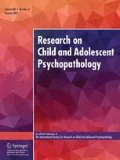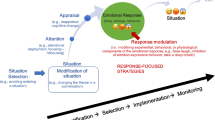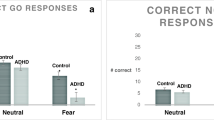Abstract
Attention-deficit/hyperactivity disorder (ADHD) is a prevalent disorder characterized by symptoms of inattention, hyperactivity, and/or impulsivity, as well as executive dysfunction. Recent work underlines the importance in understanding the role of emotion reactivity and regulatory deficits in the context of the disorder. One study (i.e., Musser et al. 2011) utilized a positive and negative emotion induction and suppression task, as well as indexes of autonomic nervous system reactivity, to examine emotional functioning in youth with ADHD. This study revealed inflexible parasympathetic-based regulation across emotion conditions among youth with ADHD compared to typically developing youth. The present study sought to replicate and extend these findings to a clinically recruited, diverse sample, while also examining sympathetic functioning. Two hundred fifty-nine participants (160 youth with ADHD), aged 5 to 13, completed the task utilized in Musser et al. 2011, while indexes of parasympathetic (i.e., respiratory sinus arrhythmia [RSA]) and sympathetic (i.e., pre-ejection period [PEP] and electrodermal activity [EDA]) reactivity were obtained. ADHD was associated with significantly elevated parasympathetic (i.e., augmented RSA) and sympathetic (as indexed by EDA) reactivity. Overall, results replicate and extend Musser et al. 2011, revealing sympathetic-linked disruptions in emotion reactivity and parasympathetic-linked disruptions in emotion regulation among youth with ADHD. Future studies of behavioral therapies for ADHD should consider the efficacy of adding an emotion regulation skills training component.



Similar content being viewed by others
References
American Psychiatric Association (2013). Diagnostic and statistical manual of mental disorders (DSM-5®). American Psychiatric Pub.
Anderson, J. C., Williams, S. M., McGee, R., & Silva, P. A. (1987). DSM-III disorders in preadolescent children: Prevalence in a large sample from the general population. Archives of General Psychiatry, 44(1), 69–76. https://doi.org/10.1001/archpsyc.1987.01800130081010.
Barkley, R. A. (2010). Deficient emotional self-regulation: A core component of attention- deficit/hyperactivity disorder. Journal of ADHD & Related Disorders, 1(2), 5–37.
Barkley, R. A., & Fischer, M. (2010). The unique contribution of emotional impulsiveness to impairment in major life activities in hyperactive children as adults. Journal of the American Academy of Child & Adolescent Psychiatry, 49(5), 503–513. https://doi.org/10.1097/00004583-201005000-00011.
Barry, R. J., Clarke, A. R., McCarthy, R., Selikowitz, M., MacDonald, B., & Dupuy, F. E. (2012). Caffeine effects on resting-state electrodermal levels in AD/HD suggest an anomalous arousal mechanism. Biological Psychology, 89(3), 606–608. https://doi.org/10.1016/j.biopsycho.2012.01.004.
Beauchaine, T. P. (2001). Vagal tone, development, and gray's motivational theory: Toward an integrated model of autonomic nervous system functioning in psychopathology. Development and Psychopathology, 13(2), 183–214. https://doi.org/10.1017/S0954579401002012.
Beauchaine, T. P., Katkin, E. S., Strassberg, Z., & Snarr, J. (2001). Disinhibitory psychopathology in male adolescents: Discriminating conduct disorder from attention-deficit/hyperactivity disorder through concurrent assessment of multiple autonomic states. Journal of Abnormal Psychology, 110(4), 610. https://doi.org/10.1037/0021-843X.110.4.610.
Beauchaine, T. P., Gatzke-Kopp, L., Neuhaus, E., Chipman, J., Reid, M. J., & Webster-Stratton, C. (2013). Sympathetic- and parasympathetic-linked cardiac function and prediction of externalizing behavior, emotion regulation, and prosocial behavior among preschoolers treated for ADHD. Journal of Consulting and Clinical Psychology, 81(3), 481–493. https://doi.org/10.1037/a0032302.
Berntson, G. G., Cacioppo, J. T., & Quigley, K. S. (1993). Respiratory sinus arrhythmia: Autonomic origins, physiological mechanisms, and psychophysiological implications. Psychophysiology, 30(2), 183–196. https://doi.org/10.1111/j.1469-8986.1993.tb01731.x.
Berntson, G. G., Bigger, J. T., Eckberg, D. L., Grossman, P., Kaufmann, P. G., Malik, M., et al. (1997). Heart rate variability: Origins, methods, and interpretive caveats. Psychophysiology, 34(6), 623–648. https://doi.org/10.1111/j.1469-8986.1997.tb02140.x.
Bradley, M. M., & Lang, P. J. (1994). Measuring emotion: the self-assessment manikin and the semantic differential. Journal of Behavior Therapy and Experimental Psychiatry, 25(1), 49–59. https://doi.org/10.1016/0005-7916(94)90063-9.
Bradley, M. M., Cuthbert, B. N., & Lang, P. J. (1990). Startle reflex modification: Emotion or attention? Psychophysiology, 27(5), 513–522. https://doi.org/10.1111/j.1469-8986.1990.tb01966.x.
Brenner, S. L., & Beauchaine, T. P. (2011). Pre-ejection period reactivity and psychiatric comorbidity prospectively predict substance use initiation among middle-schoolers: A pilot study. Psychophysiology, 48(11), 1588–1596. https://doi.org/10.1111/j.1469-8986.2011.01230.x.
Brenner, S. L., Beauchaine, T. P., & Sylvers, P. D. (2005). A comparison of psychophysiological and self-report measures of BAS and BIS activation. Psychophysiology, 42(1), 108–115. https://doi.org/10.1111/j.1469-8986.2005.00261.x.
Bunford, N., Evans, S. W., & Wymbs, F. (2015). ADHD and emotion dysregulation among children and adolescents. Clinical Child and Family Psychology Review, 18(3), 185–217. https://doi.org/10.1007/s10567-015-0187-5.
Cacioppo, J. T., Tassinary, L. G., & Berntson, G. (Eds.). (2007). Handbook of psychophysiology. Cambridge University Press.
Calkins, S. D. (2007). The emergence of self-regulation: Biological and behavioral control mechanisms supporting toddler competencies. In C. A. Brownell, & C. B. Kopp (Eds.), Socioemotional development in the toddler years: Transitions and transformations; socioemotional development in the toddler years: Transitions and transformations (pp. 261-284, Chapter xi, 497 Pages) Guilford Press, New York.
Cohen, J. (1988). Statistical power analysis for the behavioral sciences (2nd ed.). Hillsdale: Erlbaum.
Conzelmann, A., Gerdes, A. B. M., Mucha, R. F., Weyers, P., Lesch, K., Bähne, C. G., et al. (2014). Autonomic hypoactivity in boys with attention-deficit/hyperactivity disorder and the influence of methylphenidate. The World Journal of Biological Psychiatry, 15(1), 56–65. https://doi.org/10.3109/15622975.2013.829584.
Crowell, S. E., Beauchaine, T. P., Gatzke-Kopp, L., Sylvers, P., Mead, H., & Chipman-Chacon, J. (2006). Autonomic correlates of attention-deficit/hyperactivity disorder and oppositional defiant disorder in preschool children. Journal of Abnormal Psychology, 115(1), 174–178. https://doi.org/10.1037/0021-843X.115.1.174.
Ehring, T., Tuschen-Caffier, B., Schnülle, J., Fischer, S., & Gross, J. J. (2010). Emotion regulation and vulnerability to depression: spontaneous versus instructed use of emotion suppression and reappraisal. Emotion, 10(4), 563. https://doi.org/10.1037/a0019010.
Eisenberg, N., Fabes, R. A., Murphy, B., Maszk, P., Smith, M., & Karbon, M. (1995). The role of emotionality and regulation in children's social functioning: A longitudinal study. Child Development, 66(5), 1360–1384. https://doi.org/10.2307/1131652.
Fabiano, G. A., Pelham Jr., W. E., Waschbusch, D. A., Gnagy, E. M., Lahey, B. B., Chronis, A. M., et al. (2006). A practical measure of impairment: Psychometric properties of the impairment rating scale in samples of children with attention deficit hyperactivity disorder and two school-based samples. Journal of Clinical Child and Adolescent Psychology, 35, 369–385. https://doi.org/10.1207/s15374424jccp3503_3.
Fowles, D. C. (1986). The eccrine system and electrodermal activity. Psychophysiology: Systems, Processes, and Applications, 1, 51–96.
Gaub, M., & Carlson, C. L. (1997). Gender differences in ADHD: a meta-analysis and critical review. Journal of the American Academy of Child & Adolescent Psychiatry, 36(8), 1036–1045. https://doi.org/10.1097/00004583-199708000-00011.
Gershon, J. (2002). A meta-analytic review of gender differences in ADHD. Journal of Attention Disorders, 5(3), 143–154. https://doi.org/10.1177/108705470200500302.
Graziano, P. A., & Garcia, A. (2016). Attention-deficit hyperactivity disorder and children's emotion dysregulation: A meta-analysis. Clinical Psychology Review, 46, 106–123. https://doi.org/10.1016/j.cpr.2016.04.011.
Gross, J. J. (1998). Antecedent- and response-focused emotion regulation: Divergent consequences for experience, expression, and physiology. Journal of Personality and Social Psychology, 74(1), 224–237. https://doi.org/10.1037/0022-3514.74.1.224.
Gross, J. J., & Levenson, R. W. (1993). Emotional suppression: Physiology, self-report, and expressive behavior. Journal of Personality and Social Psychology, 64(6), 970–986. https://doi.org/10.1037/0022-3514.64.6.970.
Gross, J. J., & Levenson, R. W. (1997). Hiding feelings: The acute effects of inhibiting negative and positive emotion. Journal of Abnormal Psychology, 106(1), 95–103. https://doi.org/10.1037/0021-843X.106.1.95.
Hayano, J., Sakakibara, Y., Yamada, A., Yamada, M., Mukai, S., Fujinami, T., et al. (1991). Accuracy of assessment of cardiac vagal tone by heart rate variability in normal subjects. American Journal of Cardiology, 67(2), 199–204. https://doi.org/10.1016/0002-9149(91)90445-Q.
Kelsey, R. M., Ornduff, S. R., & Alpert, B. S. (2007). Reliability of cardiovascular reactivity to stress: Internal consistency. Psychophysiology, 44(2), 216–225. https://doi.org/10.1111/j.1469-8986.2007.00499.x.
Lang, P., Bradley, M. M., & Cuthbert, B. N. (1999). International affective picture system (IAPS): Instruction manual and affective ratings. University of Florida; Gainesville. FL: 2005. Technical Report A-6.
Lazzaro, I., Gordon, E., Li, W., Lim, C. L., Plahn, M., Whitmont, S., et al. (1999). Simultaneous EEG and EDA measures in adolescent attention deficit hyperactivity disorder. International Journal of Psychophysiology, 34(2), 123–134. https://doi.org/10.1016/S0167-8760(99)00068-9.
Leaberry, K. D., Rosen, P. J., Fogleman, N. D., Walerius, D. M., & Slaughter, K. E. (2018). Physiological emotion regulation in children with adhd with and without comorbid internalizing disorders: A preliminary study. Journal of Psychopathology and Behavioral Assessment. https://doi.org/10.1007/s10862-018-9644-z.
Losoya, S. H. (1995). Patterns of emotional responding in children with and without attention-deficit hyperactivity disorder.
Maedgen, J. W., & Carlson, C. L. (2000). Social functioning and emotional regulation in the attention deficit hyperactivity disorder subtypes. Journal of Clinical Child Psychology, 29(1), 30–42. https://doi.org/10.1207/S15374424jccp2901_4.
Mangeot, S. D., Miller, L. J., McIntosh, D. N., McGrath-Clarke, J., Simon, J., Hagerman, R. J., & Goldson, E. (2001). Sensory modulation dysfunction in children with attention-deficit-hyperactivity disorder. Developmental Medicine & Child Neurology, 43(6), 399–406. https://doi.org/10.1017/S0012162201000743.
Martel, M. M. (2009). Research review: A new perspective on attention-deficit hyperactivity disorder: Emotion dysregulation and trait models. Journal of Child Psychology and Psychiatry, 50(9), 1042–1051. https://doi.org/10.1111/j.1469-7610.2009.02105.x.
McQuade, J. D., & Breaux, R. P. (2017). Are elevations in ADHD symptoms associated with physiological reactivity and emotion dysregulation in children? Journal of Abnormal Child Psychology. https://doi.org/10.1007/s10802-016-0227-8.
Musser, E. D., Backs, R. W., Schmitt, C. F., Ablow, J. C., Measelle, J. R., & Nigg, J. T. (2011). Emotion regulation via the autonomic nervous system in children with attention-deficit/hyperactivity disorder (ADHD). Journal of Abnormal Child Psychology, 39(6), 841–852. https://doi.org/10.1007/s10802-011-9499-1.
O'connell, R. G., Bellgrove, M. A., Dockree, P. M., & Robertson, I. H. (2004). Reduced electrodermal response to errors predicts poor sustained attention performance in attention deficit hyperactivity disorder. Neuroreport, 15(16), 2535–2538.
Odle, M., & Ouellette, J. A. (2016). Anticipatory Electrodermal Response as a Differentiating Somatic Marker Between Children with ADHD and Controls. Applied Psychophysiology and Biofeedback, 41(4), 375–380.
Pelham Jr., W. E., Gnagy, E. M., Greenslade, K. E., & Milich, R. (1992). Teacher ratings of DSM-III-R symptoms for the disruptive behavior disorders. Journal of the American Academy of Child & Adolescent Psychiatry, 31(2), 210–218. https://doi.org/10.1097/00004583-199203000-00006.
Pelham, W. E., Burrows-MacLean, L., Gnagy, E. M., Fabiano, G. A., Coles, E. K., Tresco, K. E., et al. (2005a). Transdermal methylphenidate, behavioral and combined treatment for children with ADHD. Experimental and Clinical Psychopharmacology, 13, 111–126. https://doi.org/10.1037/1064-1297.13.2.111.
Pelham, W. E., Fabiano, G. A., & Massetti, G. M. (2005b). Evidence-based assessment of attention-deficit/hyperactivity disorder in children and adolescents. Journal of Clinical Child and Adolescent Psychology, 34, 449–476. https://doi.org/10.1207/s15374424jccp3403_5.
Polanczyk, G., de Lima, M. S., Horta, B. L., Biederman, J., & Rohde, L. A. (2007). The worldwide prevalence of ADHD: A systematic review and metaregression analysis. The American Journal of Psychiatry, 164(6), 942–948. https://doi.org/10.1176/appi.ajp.164.6.942.
Porges, S. W., Doussard-Roosevelt, J., Portales, A. L., & Greenspan, S. I. (1996). Infant regulation of the vagal "brake" predicts child behavior problems: A psychobiological model of social behavior. Developmental Psychobiology, 29(8), 697–712. https://doi.org/10.1002/(SICI)1098-2302(199612)29:8<697::AID-DEV5>3.0.CO;2-O.
Rothbart, M. K., & Derryberry, D. (1981). Development of individual differences in temperament. Advances in Developmental Psychology.
Salminen, M., Ravaja, N., Kallinen, K., & Saari, T. (2013). Mediated cues of group emotion during knowledge-work tasks: Effects on subjective and physiological responses. Interacting with Computers, 25(1), 60–73. https://doi.org/10.1093/iwc/iws006.
Satterfield, J. H., & Dawson, M. E. (1971). Electrodermal correlates of hyperactivity in children. Psychophysiology, 8(2), 191–197. https://doi.org/10.1111/j.1469-8986.1971.tb00450.x.
Shaffer, D., Fisher, P., Lucas, C. P., Dulcan, M. K., & Schwab-Stone, M. E. (2000). NIMH Diagnostic Interview Schedule for Children Version IV (NIMH DISC-IV): description, differences from previous versions, and reliability of some common diagnoses. Journal of the American Academy of Child & Adolescent Psychiatry, 39(1), 28–38.
Shaw, P., Stringaris, A., Nigg, J., & Leibenluft, E. (2014). Emotion dysregulation in attention deficit hyperactivity disorder. The American Journal of Psychiatry, 171(3), 276–293. https://doi.org/10.1176/appi.ajp.2013.13070966.
Sherwood, A., Turner, J. R., Light, K. C., & Blumenthal, J. A. (1991). Temporal stability of the hemodynamics of cardiovascular reactivity. International Journal of Psychophysiology, 10(1), 95–98. https://doi.org/10.1016/0167-8760(90)90050-N.
Shields, S. A., MacDowell, K. A., Fairchild, S. B., & Campbell, M. L. (1987). Is mediation of sweating cholinergic, adrenergic, or both? A comment on the literature. Psychophysiology, 24(3), 312–319. https://doi.org/10.1111/j.1469-8986.1987.tb00301.x.
Surman, C. B. H., Monuteaux, M. C., Petty, C. R., Faraone, S. V., Spencer, T. J., Chu, N. F., & Biederman, J. (2010). Representativeness of participants in a clinical trial for attention-deficit/hyperactivity disorder? comparison with adults from a large observational study. The Journal of Clinical Psychiatry, 71(12), 1612–1616. https://doi.org/10.4088/JCP.09m05344pur.
Taskiran, C., Karaismailoglu, S., Cak Esen, H. T., Tuzun, Z., Erdem, A., Balkanci, Z. D., et al. (2018). Clinical features and subjective/physiological responses to emotional stimuli in the presence of emotion dysregulation in attention-deficit hyperactivity disorder. Journal of Clinical and Experimental Neuropsychology, 40(4), 389–404. https://doi.org/10.1080/13803395.2017.1353952.
Uno, H. (1977). Sympathetic innervation of the sweat glands and piloarrector muscles of macaques and human beings. The Journal of Investigative Dermatology, 69, 112–120. https://doi.org/10.1111/1523-1747.ep12497915.
Visser, S., Danielson, M., Bitsko, R., Holbrook, J. R., Kogan, M. D., Ghandour, R. M., et al. (2014). Trends in the parent-report of health care provider-diagnosis and medication treatment for ADHD disorder: United States, 2003–2011. Journal of the American Academy of Child & Adolescent Psychiatry, 53(1), 34–46. https://doi.org/10.1016/j.jaac.2013.09.001.
Vitola, E. S., Bau, C. H. D., Salum, G. A., Horta, B. L., Quevedo, L., Barros, F. C., et al. (2017). Exploring DSM-5 ADHD criteria beyond young adulthood: Phenomenology, psychometric properties and prevalence in a large three-decade birth cohort. Psychological Medicine, 47(4), 744–754. https://doi.org/10.1017/S003329171600285.
Wallin, B. G. (1981). Sympathetic nerve activity underlying electrodermal and cardiovascular reactions in man. Psychophysiology, 18(4), 470–476. https://doi.org/10.1111/j.1469-8986.1981.tb02483.x.
Wechsler, D. (2011). Wechsler abbreviated scale of intelligence- second edition (WASI II). San Antonio: Psychological Corporation.
Wehmeier, P. M., Schacht, A., & Barkley, R. A. (2010). Social and emotional impairment in children and adolescents with ADHD and the impact on quality of life. Journal of Adolescent Health, 46(3), 209–217. https://doi.org/10.1016/j.jadohealth.2009.09.009.
Willcutt, E. G., Doyle, A. E., Nigg, J. T., Faraone, S. V., & Pennington, B. F. (2005). Validity of the executive function theory of attention-Deficit/Hyperactivity disorder: A meta-analytic review. Biological Psychiatry, 57(11), 1336–1346. https://doi.org/10.1016/j.biopsych.2005.02.006.
Acknowledgements
This research was supported by grants from the National Institute of Mental Health (PI: Musser, 1R03MH110812-01) and (PI: Pelham: 1R01MH099030).
Author information
Authors and Affiliations
Corresponding author
Ethics declarations
Conflict of Interest
The study was approved by the Florida International University Institutional Review Board under IRB Protocol #14-0088. Written informed consent was obtained by all parents, while written ascent was obtained by all youth who participated in the current study.
Additional information
Publisher’s Note
Springer Nature remains neutral with regard to jurisdictional claims in published maps and institutional affiliations.
Electronic supplementary material
ESM 1
(DOCX 17 kb)
Rights and permissions
About this article
Cite this article
Morris, S.S.J., Musser, E.D., Tenenbaum, R.B. et al. Emotion Regulation via the Autonomic Nervous System in Children with Attention-Deficit/Hyperactivity Disorder (ADHD): Replication and Extension. J Abnorm Child Psychol 48, 361–373 (2020). https://doi.org/10.1007/s10802-019-00593-8
Published:
Issue Date:
DOI: https://doi.org/10.1007/s10802-019-00593-8




